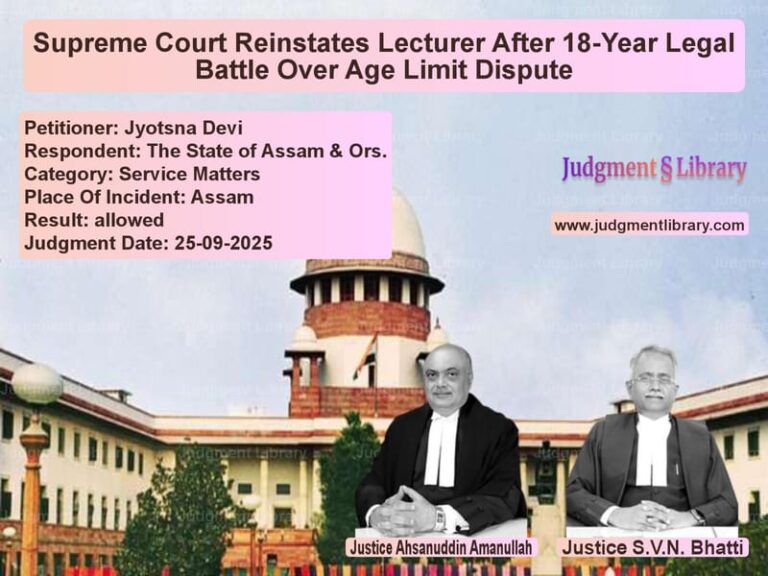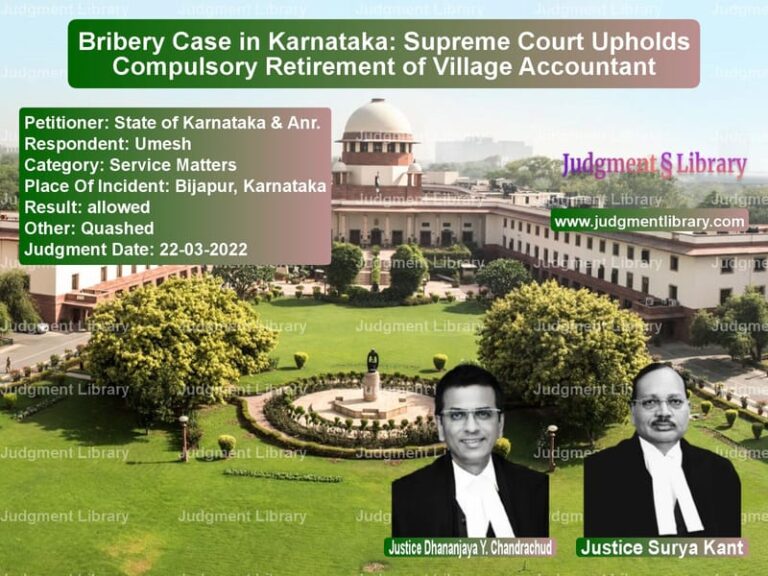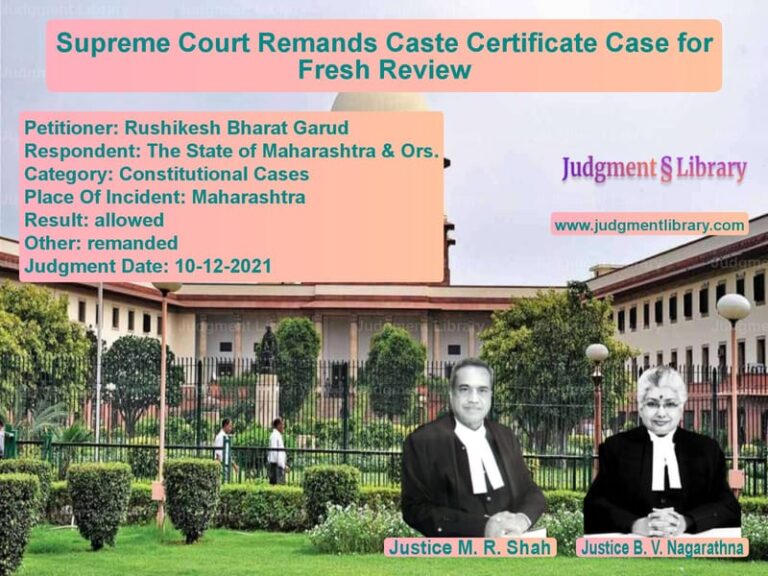Supreme Court Upholds Conviction in Kidnapping and Forced Marriage Case
The Supreme Court of India, in the case of Mohammed Yousuff @ Moula & Anr. vs. State of Karnataka, upheld the conviction of the appellants for kidnapping a minor girl and forcing her into marriage. The ruling reinforces the principle that kidnapping with intent to compel a woman into marriage is a serious criminal offense under Section 366 of the Indian Penal Code (IPC).
The case involved two brothers who abducted a minor girl, forcibly confined her, and coerced her into marriage. The trial court convicted the accused under Sections 366, 343, 323, and 506 IPC, sentencing them to three years of rigorous imprisonment. The Karnataka High Court affirmed the conviction, leading to the present appeal before the Supreme Court. After carefully analyzing the evidence and legal precedents, the Supreme Court dismissed the appeal and directed the accused to surrender.
Background of the Case
The complainant (PW-7) was the father of the victim (PW-8). The appellants, who were tenants in his house, were evicted when accused no.1 expressed his desire to marry PW-8. On July 13, 2002, at around 8:00 PM, while PW-8 was going to the market to buy a notebook, the accused forcibly took her to Punganur, Chittoor District, and conducted a marriage ceremony at a mosque.
After receiving a phone call from the accused, the complainant lodged a police report. On July 22, 2002, the police apprehended accused no.1 with the victim and later arrested accused nos.2 and 3. The charge sheet included Sections 366 (kidnapping, abduction, or inducing a woman to compel her marriage), 343 (wrongful confinement for over three days), 323 (voluntarily causing hurt), and 506 (criminal intimidation) read with Sections 114 and 34 IPC.
Arguments of the Petitioner
The appellants contended:
- The victim was 18 years old at the time and voluntarily accompanied the accused.
- No eyewitnesses testified that the victim was forced into the rickshaw.
- The High Court failed to appreciate the contradictions in the prosecution’s evidence.
- The alleged marriage was not proven as the Nikah certificate was incomplete.
Arguments of the Respondent
The State of Karnataka argued:
- The victim was a minor at the time of the incident, as proven by school records.
- The accused had a clear intention of forcing the victim into marriage, fulfilling the requirement of Section 366 IPC.
- The victim’s testimony was consistent and supported by the complainant’s statements.
- The fact that the accused forcibly confined the victim and threatened her established additional offenses under Sections 343 and 506 IPC.
Supreme Court’s Key Findings
1. Victim’s Age and Status as a Minor
The Court emphasized that school records confirmed the victim was 15 years old at the time of the offense. The Court held:
“When the victim is a minor, even if she accompanies the accused willingly, the offense under Section 366 IPC is attracted.”
2. Kidnapping and Forced Marriage
The Supreme Court reaffirmed that kidnapping with the intent to compel marriage is a distinct and serious offense. It ruled:
“The prosecution is not required to prove the actual performance of marriage; it is sufficient to establish that the accused kidnapped the victim with such intent.”
3. Criminal Confinement and Threats
The victim testified that she was forcibly confined for three days, tied up, and physically harmed. The Court found this sufficient to sustain the convictions under Sections 343 and 506 IPC.
4. Dismissal of the Appeal
The Supreme Court dismissed the appeal, holding that the lower courts correctly appreciated the evidence. It noted:
“The concurrent findings of fact by the trial court and High Court do not warrant interference.”
Final Judgment
The Supreme Court:
- Dismissed the appeal.
- Upheld the convictions and sentences awarded by the trial court.
- Directed the appellants to surrender within two months to serve their remaining sentence.
Key Takeaways from the Judgment
- Section 366 IPC is applicable even if the victim voluntarily accompanies the accused if she is a minor.
- Kidnapping with intent to compel marriage is a grave offense with a punishment of up to ten years.
- The victim’s testimony is crucial in cases of forced marriage and wrongful confinement.
- Courts will not interfere with concurrent findings of fact unless there is a glaring legal error.
Conclusion
The Supreme Court’s ruling in this case strengthens legal protections against forced marriage and kidnapping of minors. It underscores the need for strict enforcement of laws safeguarding young girls from coercion and exploitation.
Petitioner Name: Mohammed Yousuff @ Moula & Anr..Respondent Name: State of Karnataka.Judgment By: Justice N.V. Ramana, Justice S. Abdul Nazeer, Justice Surya Kant.Place Of Incident: Karnataka.Judgment Date: 22-07-2020.
Don’t miss out on the full details! Download the complete judgment in PDF format below and gain valuable insights instantly!
Download Judgment: Mohammed Yousuff @ M vs State of Karnataka Supreme Court of India Judgment Dated 22-07-2020.pdf
Direct Downlaod Judgment: Direct downlaod this Judgment
See all petitions in Bail and Anticipatory Bail
See all petitions in Juvenile Justice
See all petitions in Attempt to Murder Cases
See all petitions in Judgment by N.V. Ramana
See all petitions in Judgment by S. Abdul Nazeer
See all petitions in Judgment by Surya Kant
See all petitions in dismissed
See all petitions in supreme court of India judgments July 2020
See all petitions in 2020 judgments
See all posts in Criminal Cases Category
See all allowed petitions in Criminal Cases Category
See all Dismissed petitions in Criminal Cases Category
See all partially allowed petitions in Criminal Cases Category







